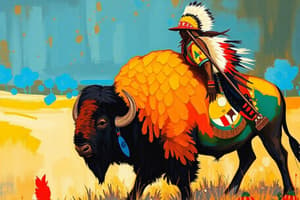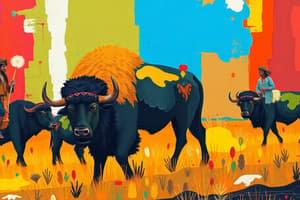Podcast
Questions and Answers
What was one method used by Native Americans to hunt buffalo?
What was one method used by Native Americans to hunt buffalo?
- Shot with arrows while on horseback (correct)
- Using firearms
- Building temporary shelters
- Setting traps
Sedentary tribes only hunted buffalo and did not engage in farming.
Sedentary tribes only hunted buffalo and did not engage in farming.
False (B)
What was the purpose of the coup stick?
What was the purpose of the coup stick?
To show honors gained in battle
The skin of the buffalo was used to make _____ and blankets.
The skin of the buffalo was used to make _____ and blankets.
Match the following buffalo body parts with their uses:
Match the following buffalo body parts with their uses:
Which group of Native Americans moved frequently to follow buffalo herds?
Which group of Native Americans moved frequently to follow buffalo herds?
Women built and owned the teepees.
Women built and owned the teepees.
Children learned by listening to elders and watching their ____________.
Children learned by listening to elders and watching their ____________.
What was pemmican?
What was pemmican?
What material was used to decorate clothing?
What material was used to decorate clothing?
Study Notes
Hunting and Usage of Buffalo
- Men hunted buffalo and served as warriors while women were responsible for cleaning and processing the buffalo.
- Buffalo hunting techniques included shooting arrows from horseback, using disguises made from buffalo or wolf skins, and driving herds off cliffs.
- Buffalo provided crucial resources: meat for food, skin for clothing and shelter, tendons for thread and bowstrings, stomachs for water pouches, tails as fly swatters, bones for tools, and horns for cups and spoons.
Cultural Practices and Warfare
- Coup sticks were symbols of honor in battle, used lightly to touch enemies, reflecting a belief against killing.
- Warriors donned war shirts and decorated their attire with eagle feathers, signifying status and bravery; elite warriors wore elaborate war bonnets made of eagle feathers.
Social Structure and Living Arrangements
- Plains Native Americans were divided into two groups: nomadic and sedentary.
- Nomadic tribes followed buffalo migrations and lived in portable teepees, while sedentary tribes engaged in farming and occasional hunting.
- Women built and owned teepees, which faced east to minimize wind exposure, featuring smoke holes to ventilate cooking smoke.
Food Preservation and Education
- Excess fresh meat was preserved as jerky; pemmican was made from dried buffalo meat ground into powder for mixing with other foods.
- Children acquired knowledge through oral tradition, listening to elders and observing parents, rather than formal education.
Daily Life and Adornments
- Cradleboards were used to carry infants on mothers' backs, exemplifying practical child-rearing techniques.
- Clothing incorporated decorative elements like porcupine quills, and both men and women wore leggings for protection against the elements and injuries.
- Settlements often functioned as trading centers, with villages cultivating crops and engaging in trade.
Studying That Suits You
Use AI to generate personalized quizzes and flashcards to suit your learning preferences.
Description
Explore the fascinating practices of Plains Native Americans, focusing on their buffalo hunting techniques and cultural warfare traditions. Learn about the importance of buffalo in their daily life and the social structure that influenced their communities. This quiz provides insights into the intricate relationship between resources and cultural identity.



